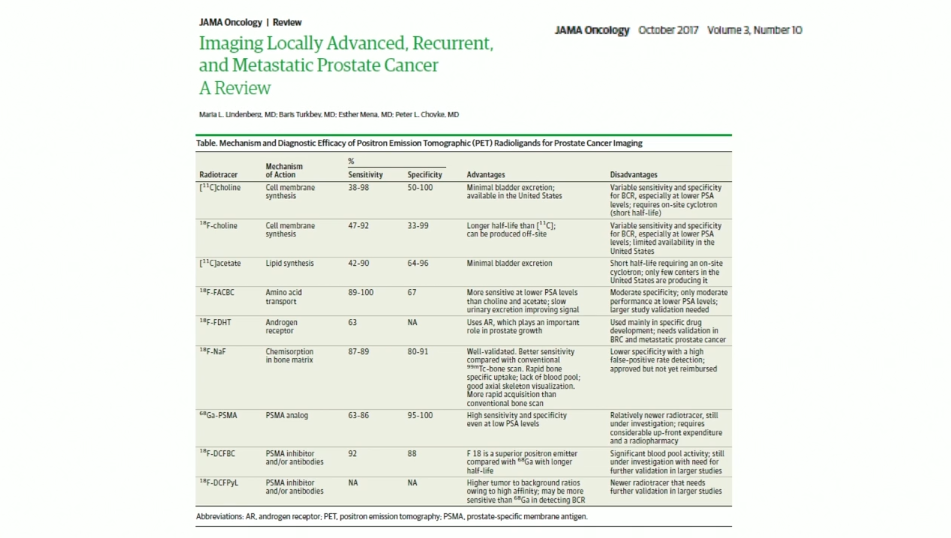Nelson N. Stone, MD, presented “Advanced PET Imaging for Prostate Cancer Staging” during the 24th Annual Southwest Prostate Cancer Symposium on April 11, 2019 in Scottsdale, Arizona.
How to cite: Stone, Nelson N. “Advanced PET Imaging for Prostate Cancer Staging” April 11, 2019. Accessed Jun 2025. https://grandroundsinurology.com/advanced-pet-imaging-for-prostate-cancer-staging/
Advanced PET Imaging for Prostate Cancer Staging – Summary:
Nelson N. Stone, MD, discusses the importance of precisely locating sites of failure in recurrent prostate cancer patients. He focuses on how new positron emission tomography (PET)/CT imaging agents can improve detection, noting the need for improved detection methods in patients with low PSA levels.
Abstract:
When managing patterns of failure in prostate cancer (PCa), detecting failure location is essential to guiding salvage therapy decisions. Local therapy is extremely effective, and multisite therapy may be beneficial, though more research is required in this area. However, successful local therapy requires adequate imaging.
Traditional PCa imaging with bone scans, CT scans, and MRI can be effective for initial staging and evaluation. But, these methods have limitations in their ability to locate small lesions. Patients with low PSA levels and small lesions are most likely to benefit from local therapy. Therefore, it is imperative that scanning technology becomes more accurate. Researchers have turned to positron emission tomography (PET) scanning as a potential improvement on traditional imaging modalities.
There are several emerging PET agents, including radiotracers and prostate specific membrane antigen inhibitors/antibodies. Of these agents, ¹⁸F-fluciclovine, for instance, shows promise, and represents an improvement over ¹¹C-choline across all PSA levels.
While these agents have proven high specificity rates, their sensitivity rates are not as dependable. Additionally, these agents do not work as well with those low-PSA patients who stand to benefit most. Because of this, research must continue to determine whether this kind of scanning will be a more effective mechanism for finding small lesions than MRI. Regardless, PET with ¹⁸F-fluciclovine has already proven to change how patients manage recurrent PCa. A study looking at men suspected of recurrence found that 126 of the 213 patients had a change in management after receiving the PET scan. This indicates that, though the full potential of new PET agents has yet to be determined, the technology is already providing key information older forms of imaging have missed.
About the Southwest Prostate Cancer Symposium
The Southwest Prostate Cancer Symposium (SPCS) is a multi-day conference that seeks to educate urologists, radiation oncologists, medical oncologists, and other healthcare professionals involved in the treatment of prostate cancer. The topics focus on current technical aspects of diagnosis and treatment of localized and advanced disease, particularly regarding imaging, technology, and training in the related devices. Dr. Stone presented this lecture during the 24th SPCS in 2019. In 2020, the 25th SPCS will also offer training sessions involving imaging, scanning, and prostate cancer treatment related devices on site. Please visit this page in order to register for future SPCS meetings.
ABOUT THE AUTHOR
Nelson N. Stone, MD, is Professor of Urology, Radiation Oncology, and Oncological Sciences at the Icahn School of Medicine at Mount Sinai and chief medical officer at Viomerse, Inc.
Dr. Stone earned his medical degree from the University of Maryland in 1979. He completed a Residency in General Surgery in 1981 at the University of Maryland, followed by a Residency in Urology at the University of Maryland. He then completed a Fellowship in Urologic Oncology at Memorial Sloan-Kettering Cancer Center and a Research Fellowship in Biochemical Endocrinology at Rockefeller University in 1986. He was Chief of Urology at Elmhurst Hospital Queens from 1986-1996.
Dr. Stone has founded several medical companies and serves on the editorial board of many scientific journals. He is a member of many professional societies, including the Prostate Conditions Education Council, the Society for Minimally Invasive Therapy, the New York State Urological Society, the American Association of Clinical Urologists, and the American Urologic Association. Dr. Stone has participated in approximately 25 research studies on prostate cancer and has authored more than 500 articles, abstracts, and book chapters, primarily on prostate cancer. He invented the real-time technique for prostate brachytherapy in 1990 and has trained more than 5,000 physicians worldwide through his company ProSeed. His most recent company, Viomerse, creates synthetic body parts (phantoms) for surgical training and has recently released an extended reality remote training platform.

